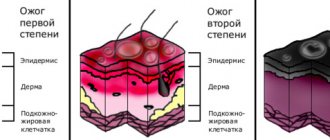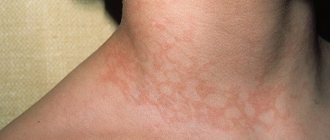Hoarseness of voice is an inflammatory process in which the mucous membrane of the vocal folds is involved, causing the disease. The prerequisites for the occurrence of a problem can be both physiological and psychogenic, emotional in nature. Our vocal apparatus is a complex mechanism consisting of interconnected areas controlled by the central nervous system. This includes the vocal apparatus, which includes groups of resonators (pharynx, trachea, lungs), and the larynx, the place where sounds are formed. If one section fails, the operation of the entire vocal apparatus is disrupted. As a result, problems arise with sound production, hoarseness and hoarseness of the voice. Let's look at common causes of the disease and, of course, talk about diagnostic and treatment methods.
“Our vocal apparatus is a complex mechanism consisting of interconnected areas controlled by the central nervous system. If one section fails, the operation of the entire vocal apparatus is disrupted.”
Causes of hoarseness
The problem can be caused by various factors. The most common ones include:
- Laryngitis.
- Disturbances in the endocrine system.
- Excessive tension in the vocal folds.
- Stress, strong negative emotions.
Laryngitis is the most common cause of hoarseness. The disease develops against the background of other infectious and inflammatory processes that occur in the organs of the respiratory system: bronchitis, rhinitis, tuberculosis, ARVI.
With laryngitis, pain and discomfort appear in the throat, the voice deepens, and difficulty breathing is often observed. In some cases, the temperature rises, appetite decreases, headaches, chills, and weakness in the body appear.
To treat laryngitis, topical medications are prescribed in the form of sprays. Lozenges help temporarily relieve pain. For severe coughs, mucus thinners. If the origin of laryngitis is allergic, the doctor may prescribe antihistamines. Antibiotics are used as a last resort if a bacterial infection is present.
Disturbances in the endocrine system are another factor that causes hoarseness. Often the endocrine system causes the vocal apparatus to react to disturbances that have arisen. If you suspect a disruption in the endocrine system, you should contact an endocrinologist, since the otolaryngologist does not perform the main function here. The main thing is not to self-medicate, but to consult a specialist as soon as possible.
Singers, guides, teachers, lecturers - in short, people whose profession involves constant increased load on the vocal folds - may experience overstrain.
It is important to learn how to control your voice and avoid overexertion. For this purpose, strengthening techniques have been developed that need to be practiced from time to time. You can learn more about hygiene and prevention of dysphonia for vocalists from our article.
To avoid hoarseness, you should drink water regularly, avoiding dry throat to reduce the load on the folds, especially during a long monologue or negotiations. Due to nervous tension, the voice may shrink or disappear altogether. Here we are already dealing with the psychological aspect, since the voice makes itself felt as a reaction to stress. Hoarseness often becomes a signal of neurological diseases that lead to disruption of the innervation of the folds and paralysis of the laryngeal nerves.
You should immediately consult a doctor to prevent the process from prolonging and the formation of nodules in the vocal folds. How to choose a suitable doctor is described in the article.
Another cause of hoarseness is a violation of metabolic processes in the body. If the hormone is not produced by the thyroid gland in sufficient quantities, the voice becomes dull. In addition, the mucous membrane dries out when there is a lack of fluid in the body.
Hoarseness is also common among smokers, people who enjoy irritating foods and drinks, and frequent mouth breathers. A shrunken voice can be caused by drinking alcoholic beverages, severe tension in the larynx, or decreased immunity.
Healthy voice and hoarse voice: physiology
Our throat has a complex structure. In the throat of any person there is an organ responsible for sound production. This organ is the larynx. It contains muscle folds - the vocal cords. They are very elastic. When an adult is silent, the vocal cords are open and there is a glottis between them. Sound is created when the air exhaled by the lungs passes through the vocal cords and causes them to vibrate and vibrate. If the ligaments are healthy, elastic, and not thickened, the sounds produced will be clear, sonorous, and loud. An adult begins to speak in a hoarse voice when the ligaments thicken and obstacles appear during the passage of the sound wave.
The condition when the ligaments become hoarse is called dysphonia. Loss of voice is called aphonia.
There are many reasons why you may become hoarse or hoarse. Before voicing these reasons, I would like to cite a number of interesting facts about the uniqueness of our vocal apparatus:
- Every adult's voice sounds different. The reason for this is the different length and thickness of the ligaments in the throat: in men they are longer.
- The longer an adult's larynx, the longer his vocal cords.
- The vocal cords in the throat can shorten, stretch, thicken and narrow, making them very elastic.
- Every adult's vocal cords can stretch to ten times their original size.
- You can train the ligaments to stretch, which is what professional singers do regularly when they do special exercises for the throat.
- Animals also have vocal cords in their throats, but only humans have learned to control them.
The voice of an adult is a unique instrument. Therefore, it is important to find out the reasons why he may become hoarse, hoarse, or even disappear altogether.
Initial symptoms
In the first stages, the volume of a person’s voice decreases, its quality and timbre changes. The folds quickly become tired, and it becomes uncomfortable for a person to swallow or talk. The most dangerous type of hoarseness is chronic, since in this case the entire vocal apparatus is gradually and permanently rebuilt. Subsequently, hoarseness increases and the voice weakens. When diagnosing, an otolaryngologist finds out the background and history of the development of the disease, and treatment measures taken previously. An ENT examination is performed with direct or indirect laryngoscopy. If required, the specialist will prescribe an ultrasound of the thyroid gland, MRI or computed tomography to identify possible causes of laryngeal depression.
“In the first stages, the volume of a person’s voice decreases, its quality and timbre changes. The folds quickly become tired, and it becomes uncomfortable for a person to swallow or talk.”
Nervous system diseases
Here we come to the causes of hoarseness, which are not directly related to pathologies of the ENT organs. One of these reasons is neurological. Hoarseness is caused by paralysis of the superior laryngeal nerve or recurrent laryngeal nerve. Palsy of these nerves itself is rare. It usually occurs against the background of syphilis, botulism, rabies, diphtheria, tumors of the esophagus and thyroid gland. All these diseases are very serious and can only be treated in a hospital setting. It is possible to predict whether the functions of the vocal apparatus will be restored and whether the symptoms of the disease will go away only after conducting the necessary examinations.
Also, being under constant stress or sudden fear can affect the ligaments and lead to hoarseness. In this case, complete vocal rest and the use of sedatives are indicated.
Hoarseness in children: why does it occur?
Children are just as susceptible to hoarseness as adults. There are several factors that lead to problems in the functioning of the vocal folds:
- Colds, ARVI, tracheitis. A hoarse voice may be the first sign of these diseases.
- Overstrain of the vocal folds. Often found in active, noisy children who like to scream.
- Laryngitis. The most common cause of failure, as in adults. With laryngitis, infectious inflammation occurs in the larynx, and therefore requires immediate medical attention.
Some medications can also cause children to experience hoarseness.
It should be remembered that boys undergo hormonal changes in the body between the ages of 12 and 15 . At this time, the vocal folds lengthen and the voice becomes hoarse. This is normal. If hoarseness persists for six months, there is nothing to worry about. If after this period there are no changes, and your voice remains shrunken and unnatural, you should consult a doctor.
In young children, hoarseness may indicate pathologies, for example, congenital cysts or disorders in the structure of the vocal apparatus.
From the article you will learn in detail about the causes, treatment of hoarseness in children and general recommendations for preventing the problem.
What to do if your throat is hoarse?
If, in addition to hoarseness of voice, a person experiences other pathological symptoms, then you need to consult a doctor as soon as possible. The doctor will identify the cause of the disorder and prescribe treatment. It is often carried out with drugs that are available only by prescription.
A specialist who treats aphonia or dysphonia is called an otolaryngologist. You can also contact a phoniatrist.
Drug treatment
You can get rid of hoarseness only after the cause that caused this pathological symptom is eliminated.
For therapy, medications are prescribed such as:
- Lozenges.
- Sprays with anti-inflammatory effect.
- Expectorants.
- Antihistamines.
If hoarseness is a consequence of a cold or excessive strain on the ligaments, then you can get rid of it with the help of special tablets. They need to be absorbed. Taking such medications can soften a sore throat and make your voice softer. The most popular remedies for hoarseness are: Falimint, Faringosept, Strepsils, Anti-Angin, Septolete.
Sprays are convenient because the medicine is delivered directly to the area of inflammation. This allows you to quickly get rid of hoarseness and other symptoms of the disease. Sprays are prescribed for sore throat and laryngitis.
Trade names of drugs:
- Tantum Verde
- Strepsils
- Ingalipt
- Theraflu Lar
- Chlorophyllipt
- Aquamaris
- Miramistin
- Kamenton
Each of the listed drugs has a specific effect: fights bacteria and viruses, destroys pathogenic flora, moisturizes a sore throat, eliminates sore throat, relieves pain, relieves inflammation, relieves cough.
Hoarseness is a common symptom of laryngitis. With this disease, a person suffers from a strong barking cough. It leads to irritation of the larynx and vocal cords, which causes changes in the voice. If the treatment is chosen correctly, then the problem will be dealt with in the shortest possible time. The doctor must prescribe medications that dilute mucus and promote its clearance from the respiratory tract.
To cope with hoarseness, you need not only to take medications, but also to drink as much water as possible.
The following drugs have mucolytic properties:
- Bromhexine.
- Codelac.
- Acetylcysteine.
- Amtersol.
- Pertussin.
Colds are not always the cause of hoarseness. Sometimes this symptom appears against the background of an allergic reaction of the body.
In this case, antihistamines are required, including:
- Loratadine.
- Zyrtec.
- Zodak.
- Claritin.
- Cetrin.
These drugs belong to the latest generation of drugs, so they do not give significant side effects, do not cause drowsiness or lethargy. Thanks to their use, swelling in the throat is relieved, the voice is restored, and hoarseness goes away.
To get rid of hoarseness, it is recommended to supplement treatment with inhalations. They are performed using a special device - a nebulizer. The substances that pass through it do not heat up and do not irritate the mucous membrane of the throat and ligament tissue. Drugs that can be used for inhalation: Lazolvan, Ambrobene, Acetylcysteine, Dioxidin.
Effects of inhalation with a nebulizer:
- Moisturizing mucous membranes.
- Liquefaction and removal of mucus from the respiratory system.
- Improving the condition of the vocal cords.
- Decreased intensity of the cough reflex.
If your voice is hoarse, you need to gargle. This procedure helps relieve swelling and restore its mucous membranes. You need to treat a sore throat at least 5 times a day. Drugs that have an anti-inflammatory and disinfecting effect: Stopangin, Rotokan, Miramistin, Hexoral, Tantum Verde.
Video: Living Healthy: Why Am I Hoarse? Why does the voice disappear?
What should you not do if you have hoarseness?
If your voice becomes dry, you should reduce your speech to a minimum so as not to strain your vocal folds. If possible, it is better to take a day off from work and get treatment. And, of course, it is not recommended to self-medicate for a long time. If after 1-2 days or more the voice is not restored, you should consult a doctor to clarify the problem.
Smoking and drinking alcohol should be avoided as this can also lead to sore throat. Juices, especially those containing citrus fruits, such as orange and grapefruit, should be excluded from the diet, as should cola, green tea, and coffee. All this provokes mucous membranes and aggravates the situation. Hypothermia and eating cold foods will also worsen the problem. It is necessary to avoid hot, spicy foods that can cause irritation.
Following these simple recommendations will speed up the healing process and voice restoration.
“When your voice becomes dry, you should reduce your speech to a minimum so as not to strain your vocal folds. If possible, it is better to take a day off from work and get treatment. If after 1-2 days or more the voice is not restored, you should consult a doctor to find out the problem.”
When to see a doctor?
In some cases, hoarseness in your voice cannot be tolerated.
You should immediately consult a doctor if the following symptoms occur:
- Increased body temperature.
- Heavy sweating.
- Cough.
- Thick mucus produced when coughing.
- Dyspnea.
- Great weakness in legs and body.
- Weight loss.
- Chest pain.
- Loss of appetite, nausea.
Self-treatment without knowing the cause of hoarseness is unacceptable. Taking inappropriate medications can cause a deterioration in health, or contribute to the transition of the disease to a chronic form.
How to treat hoarseness?
Before prescribing a course of treatment, the otolaryngologist performs a visual examination of the larynx to identify the cause of the disease. Visual diagnostics and endoscopy of the throat are carried out: an integrated approach is used for a full analysis.
When diagnosing, specialized tools and equipment are used. A differentiated analysis of symptoms is necessary when it is not possible to find out the real cause of the problem. The doctor may use an endoscope, a probe to examine the throat and larynx during laryngoscopy. The otolaryngologist also works with the deep laryngeal laryngeal speculum. A fibrolaryngoscope is used to examine the nasopharynx under local anesthesia of the nasal cavity. Another commonly used tool is a strobe light, which allows you to diagnose pathologies. Electrophysical studies are carried out, the level of mobility of the larynx and folds in dynamics is assessed. Anesthesia is not required here, since the procedures do not cause discomfort or pain.
The course of therapy is prescribed taking into account the problem, the cause of its occurrence, medical history and examination. To treat hoarseness use:
- Drugs aimed directly at eliminating disorders in the vocal apparatus.
- Anti-inflammatory drugs, if hoarseness is accompanied by fever, more than 38 degrees.
- Antibiotics if the problem is caused by a bacterial infection causing hoarseness.
In addition to taking the above medications, physiotherapy is carried out, expectorants are prescribed in the presence of bronchitis or tracheitis, as well as vitamin complexes to increase strength and immunity.
When prescribing treatment, individual parameters are taken into account: age, concomitant and previous diseases, structural features of the larynx, the presence or absence of allergic reactions.
How does the human vocal apparatus work?
The larynx is not only part of the respiratory tract, it is an organ of sound production. It contains the vocal cords, a paired organ that is a collection of muscles. When a person is silent, there is a distance between the ligaments - the laryngeal cleft. For sound to be produced, the ligaments must be pressed tightly against each other. With such a tight closure, the air flow leaving the lungs as you exhale passes through the closed ligaments, causing them to vibrate. At this moment, sound arises and we hear human speech.
If the voice becomes hoarse and hoarse, it means that the ligaments cannot fit tightly together, as a result of which the sonority of speech is lost.
A condition in which the vocal cords become hoarse can be caused by their inflammation or a number of other reasons, which we will discuss further.
How to increase the effectiveness of treatment at home?
When restoring your voice, you must follow a number of recommendations. Medicines prescribed by an otolaryngologist should be taken in a clearly indicated dosage. You need to increase your consumption of warm drinks, switch to bland food, walk in the fresh air, and use a humidifier at home, if possible. Staying in a room with high humidity (up to 70%) will promote a speedy recovery. Of course, the emotional mood is important. Psychosomatics is an important part of the treatment of any disease. It is important to set yourself up correctly, improve your mood, tune in to a speedy recovery, and be in a pleasant environment.
“Increase your consumption of warm drinks, switch to bland foods, and eliminate spicy foods from your diet. Get outside more and use a humidifier at home.”
Often there is no reason to worry and see a doctor. It is enough to follow a drinking regime, take care of a sufficient level of humidity in the room, and reduce vocal activity in order to recover faster.
Drinking plenty of fluids means drinking not only tea, but also soups and broths at room temperature. Both cold and hot liquids should be avoided.
An excellent means of recovery is honey. The product relieves inflammation, improves immunity, and restores the body. You can consume honey, for example, with herbal tea, warm milk, or on its own. This will have a beneficial effect on irritated vocal folds.
It is useful to drink black or herbal tea with chamomile and thyme, and add ginger to it. Tea with raspberry jam and tincture of raspberry leaves will also be beneficial.
Another good way to restore the sonority of your voice is inhalation. A simple inhaler is sold at any pharmacy. You can carry out inhalation procedures yourself, at home. To do this, just boil water poured into a pan and breathe over it for 15-20 minutes, covered with a towel.
At the first signs of hoarseness, pregnant women should immediately consult a doctor, as this may affect the development of the fetus and congenital abnormalities. It is important to respond to even seemingly minor hoarseness as quickly as possible, as there is a risk of a serious problem arising.
In any case, difficulty breathing, sore throat, and rapid fatigue indicate disturbances in the functioning of the vocal apparatus and become a reason for taking action. If you experience even minor discomfort, you can contact our clinic. Our medical institution specializes in phoniatrics: one of the rarest areas in medicine - phoniatrics and helps patients of all ages cope with diseases of the ear, nose and throat. Take care of your health and be vigilant!
View this post on Instagram
Publication from |LEV RUDIN'S CLINIC| (@levrudin)
What not to do?
If a person’s voice is hoarse, the following actions are prohibited:
- You cannot sing, shout or talk loudly. Ligaments need to be protected.
- You should not take vasoconstrictor drugs. They contribute to drying of the mucous membranes.
- You should not drink drinks that contain caffeine. Avoid coffee altogether, and avoid drinking strong tea and energy drinks. However, you need to drink as much clean water as possible.
- Smoking and staying in smoky areas is prohibited.
- Acidic foods should be excluded. It is allowed to eat only lemons, but in combination with honey.
- You should not drink alcoholic beverages. Alcohol not only negatively affects the condition of the ligaments, but also removes fluid from the body.
- Do not stay in dusty rooms. Small particles can settle on the vocal cords, increasing their inflammation.
- You should not be in the cold or damp.
Treatment methods
In order to get rid of unpleasant symptoms and regain the ability to speak fully, you must strictly follow the recommendations of the otorhinolaryngologist and follow all his instructions. An effective treatment strategy looks like this:
- Voice rest
- Nutrition adjustments.
- Drink plenty of fluids.
- Rinse.
- Treatment with medications.
- Physiotherapeutic procedures.
Give your ligaments a rest. Ideally, it would be a day of silence. Under no circumstances should you whisper. Whispering makes the ligaments tense even more than full speech. If the need arises, it is better to say the phrase quietly, but do not whisper!
Eliminate from your diet foods that are too hot, hard, sour or spicy, that is, all foods that irritate an already sore throat. During treatment, give up bad habits - alcohol and smoking.
In this case, the drinks consumed should be warm or at room temperature. Teas, fruit drinks, compotes, herbal infusions, and mineral water are suitable. Don’t forget about this popular folk remedy - warm milk with honey or butter. This drink seems to envelop the mucous membrane of the pharynx and have a beneficial effect on it. The only thing is that you need to be careful with honey so as not to provoke an allergic reaction.
For these symptoms, rinsing the throat shows a very good effect. As a rinse, you can use herbal decoctions, furatsilin solution, as well as medications recommended by an ENT doctor.
Drug therapy may include taking antibiotics, antiviral, antiseptic, antihistamines, antipyretics, using lozenges, lozenges, and sprays to relieve pain in the throat.
Physiotherapy perfectly complements drug treatment. Physiotherapy procedures are carried out in an ENT clinic under the supervision of an otolaryngologist and significantly speed up the recovery process.
The correct treatment tactics can be prescribed only after examination by an ENT doctor
There is no need to try to look for answers on the Internet or from friends and acquaintances. Each diagnosis requires a specific approach. Incorrectly administered therapy can cause complications!
Home ambulance
How can you help yourself if you suddenly stop speaking due to loss of voice? How to get your voice back quickly?
Popular folk recipes
There are quite a lot of simple recipes for those who want to quickly restore their lost voice. This:
1. Beverages
Drink more warm fruit drinks, compotes, herbal teas. To prepare them, you need to use honey, ginger, fruits and berries with a high content of vitamin C. Drinks containing caffeine (coffee) should be excluded. A spoonful of cognac in herbal tea won't hurt at all. But it’s not worth treating silence and hoarseness with cognac alone. There are patients who are confident that 50 grams of cognac or other alcohol will improve their voice. This is a misconception because the effect is very short-lived. It is better to take the following treatment:
- Warm milk with honey and a spoonful of butter is beneficial;
- Honey with warm milk and carrot juice in equal parts also helps;
- warm beer is also used to restore vocal cords;
- You can make a horseradish tincture. To do this, chop 2 cm of the root, pour boiling water (1 glass) and leave. Add sugar and take a tablespoon every hour throughout the day.
- if there is aloe in the house, chop the leaf of the plant and mix in equal parts with honey. This mixture should be kept in your mouth, repeating the procedure up to 3-5 times throughout the day.
- The so-called eggnog has been tested and works. These are whipped yolks with sugar, milk with cognac and spices. If you add honey there, you will get the most famous way to fight colds and hoarseness.
2. Rinse
In addition to drinking, you need to gargle with herbal infusions: chamomile, sage, calendula. You cannot use soda for rinsing, it dries out the mucous membrane. But salt rinses are useful. The simplest and most harmless method is a solution of salt with iodine for gargling, or you can simply lubricate the throat with Lugol.
3. Inhalations
Inhalations can be either steam, according to grandma’s method, or using modern inhalers. You can use essential oils and medicinal herbs:
- peach oil with brewed St. John's wort and oregano moisturizes and softens the throat;
- A steamed jacket potato is still a good healer, especially when you don’t know how to restore your voice after a cold.
4. Compresses
To restore your voice, you can make a vodka compress at night, only you need to dilute the vodka with water. A warm compress with vegetable oil is also useful. A cabbage leaf rubbed with honey is suitable as an ingredient for a compress. The throat must be wrapped in a warm scarf.
Therapeutic exercises
At home, you can use breathing exercises, which today phonation doctors select individually for patients, but there are already general techniques.
Therapeutic exercises to restore the voice include light massage of the larynx , breathing exercises and sound chanting. The massage is performed with two fingers, making circular movements from top to bottom. This gives a rush of blood to the ligaments, which improves the effect of the exercises.
You should breathe first through your nose, then nose-to-mouth, then through the right nostril, then through the left. Alternately inhale through one nostril and exhale through the opposite.
Sound chanting is done for different sounds. For example, the sound “F” is similar to blowing out a candle, when diaphragmatic breathing , and vowel sounds are pronounced in one breath after a deep entry, while simultaneously tapping the chest with the hand.
Today, proper breathing and exercises to strengthen ligaments are part of a comprehensive approach to the treatment of human sound pathologies.










